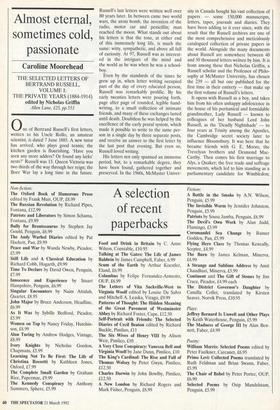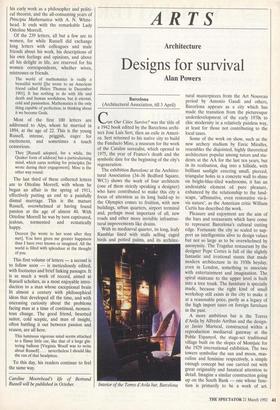Almost eternal, sometimes cold, passionate
Caroline Moorehead
THE SELECTED LETTERS OF BERTRAND RUSSELL, VOLUME I: THE PRIVATE YEARS (1884-1914) edited by Nicholas Griffin Allen Lane, £25, pp.553 0 ne of Bertrand Russell's first letters, written to his Uncle Rollo, an amateur scientist, is dated 7 June 1885. A new tutor has arrived, who plays good tennis; the kitchen garden is flourishing. 'Have you seen any more adders? Or found any larks' nests?' Russell was 13. Queen Victoria was two thirds of the way through her reign; the Boer War lay a long time in the future.
Russell's last letters were written well over 80 years later. In between came two world wars, the atom bomb, the invention of the radio, motor car and penicillin; man reached the moon. What stands out about his letters is that the tone, at either end of this immensely long life, is much the same: witty, sympathetic, and above all full of curiosity. At 97, Russell was as interest- ed in the intrigues of the mind and the world as he was when he was a school- boy.
Even by the standards of the times he grew up in, when letter writing occupied part of the day of every educated person, Russell was remarkably prolific. By his early twenties letters were pouring forth, page after page of rounded, legible hand- writing, to a small collection of intimate friends, and many of these exchanges lasted until death. Doubtless he was helped by the excellence of the early postal system, which made it possible to write to the same per- son in a single day by three separate posts, and receive an answer to the first letter by the last post that evening. But even so, Russell loved writing.
His letters not only spanned an immense period, but, to a remarkable degree, they have been found, gathered together and preserved. In the 1960s, McMaster Univer-
sity in Canada bought his vast collection of papers - some 150,000 manuscripts, letters, tapes, journals and diaries. They have been adding to it ever since, with the result that the Russell archives are one of the most comprehensive and meticulously catalogued collection of private papers in the world. Alongside the many documents about Russell are somewhere between 40 and 50 thousand letters written by him. It is from among these that Nicholas Griffin, a Russell scholar and the Professor of Philo- sophy at McMaster University, has chosen the 239 - all but one published for the first time in their entirety - that make up the first volume of Russell's letters.
It opens with Russell as a boy, and takes him from his often unhappy adolescence in the house of his puritanical and formidable grandmother, Lady Russell - known to colleagues of her husband Lord John Russell, as the 'Deadly Nightshade' - to four years at Trinity among the Apostles, the Cambridge secret society later to influence Bloomsbury. It was here that he became friends with G. E. Moore, the Trevelyan brothers and Desmond Mac- Carthy. Then comes his first marriage to Alys, a Quaker; the free trade and suffrage movements, which led to him standing as a parliamentary candidate for Wimbledon; his early work as a philosopher and politi- cal theorist, and the all-consuming years of Principia Mathematica with A. N. White- head. It ends with the remarkable Lady Ottoline Morrell.
Of the 239 letters, all but a few are to women, for while Russell did exchange long letters with colleagues and male friends about his work, his descriptions of his own feelings and opinions, and above all his delight in life, are reserved for his women correspondents, whether wives, mistresses or friends.
The world of mathematics is really a beautiful world [[he wrote to an American friend called Helen Thomas in December 1901]. It has nothing to do with life and death and human sordidness, but is eternal, cold and passionless. Mathematics is the only thing capable of perfection; in thinking about it we become Gods.
Most of the first 100 letters are addressed to Alys, whom he married in 1894, at the age of 22. This is the young Russell, intense, priggish, eager for excitement, and sometimes a touch censorious.
Thee [Russell adopted, for a while, the Quaker form of address] has a particularising mind, which cares nothing for principles [he wrote during their engagement]. Mine is the other way round.
The last third of these collected letters are to Ottoline Morrell, with whom he began an affair in the spring of 1911, effectively putting an end to a painfully dismal marriage. This is the mature Russell, overwhelmed at having found passion at the age of almost 40. With Ottoline Morrell he was by turn captivated, jealous, tormented and ecstatically happy.
Dearest [he wrote to her soon after they met], You have given me greater happiness than I have ever known or imagined. All the world is filled with splendour at the thought of you.
This first volume of letters — a second is to follow soon — is meticulously edited, with footnotes and brief linking passages. It is as much a work of record, aimed at Russell scholars, as a most enjoyable intro- duction to a man whose exceptional brain lit almost a century with philosophical ideas that developed all the time, and with unceasing curiosity about the problems facing man at a time of continual, momen- tous change. The good friend, besotted suitor, cold sceptic, and man of insight, often battling it out between passion and reason, are all here.
This luminous vigorous mind seems attached to a flimsy little car, like that of a large glit- tering balloon [Virginia Woolf was to write about Russell] . . . nevertheless I should like the run of that headpiece.
To this day, his readers continue to feel the same way.
Caroline Moorehead's life of Bertrand Russell will be published in October.



























































 Previous page
Previous page